© GDKE, U. Rudischer

Welcome to the Landesmuseum Mainz
Mainz State Museum is the museum of cultural history in Rhineland‑Palatinate and can be found in the Grosse Bleiche right in the centre of Mainz. The baroque building in the converted electors’ stables later became a ‘Golden-Ross-Kaserne’ with a modern glass and steel structure in the inner courtyard. Not only is it home to one of the most important collections on cultural history in the state of Rhineland‑Palatinate, it also opens up for a range of cultural events outside of museum opening hours.
The extensive collection on the history of art and culture extend from the beginnings of culture to modern art. They clearly reflect the varied aspects of cultural and social history over the millennia in a unique way.
The collections showcase: Prehistory, Roman times, the Middle Ages, the Renaissance, the Baroque period, graphics from the 16th to the 20th century, Dutch painting, 18th-century porcelain, 19th-century painting, Judaica, city history, Art Nouveau glass and modern art.
There are numerous temporary exhibitions on art, culture and history, including contemporary history, that complement the extensive collections.
Contact
Generaldirektion Kulturelles Erbe Rheinland-Pfalz
Landesmuseum Mainz
Große Bleiche 49 - 51
55116 Mainz
phone +49 (0) 6131 2857 0
landesmuseum-mainz(at)gdke.rlp.de
The Landesmuseum Mainz is an institution of the General Directorate for Cultural Heritage Rhineland-Palatinate.
Download our brochure living culture.
closed on monday
Tuesday 10:00–20:00
Mon–Sun 10:00–17:00
Please note the information on public holidays.
Use our online shop to purchase your ticket for museum visits.
| 6,00 € | Adults |
| 4,50 € | Per adult in groups of 10 or more |
Free Admission for children up to and including 6 years old.
| 3,00 € | Children/Youth (7 to 17 years old with ID) |
| 2,00 € | Children's, Youth, and School Groups (10 or more people up to 18 years old with ID) |
| 6,00 € | Family Ticket I (1 adult with up to 4 children aged 7 and older) |
| 12,00 € | Family Ticket II (2 adults with up to 4 children aged 7 and older) |
Guided tours in foreign languages available upon request.
- Multi-storey carpark in the Bleichenviertel district, access via Balthasar Maler-Gasse.
- Various car parks in the city centre and on the banks of the Rhine.
The Mainz State Museum is fully accessible for visitors with restricted mobility, with level access, even ramps, large lifts and automatic doors. There is a spacious wheelchair toilet with an adjustable-height toilet bowl in the basement toilet block. A wheelchair can also be borrowed from the front desk on request.
For our visually-impaired guests, there are two tactile books that can be borrowed from the front desk. These describe two of the famous paintings at Mainz State Museum: one is the ‘Madonna and Child’ by Lorenzo di Credi (about 1480) and the other is ‘Woman’s Head’ by Pablo Picasso (about 1908).
The permanent exhibition
© GDKE, LMM
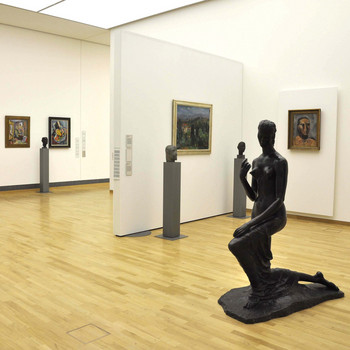
Department of Modern Art
Max Slevogt, Lovis Corinth, Max Beckmann, and Hans Purrmann welcome you in the Department of Modern and 20th-Century Art. You can also expect insights into current research, such as provenance research, as well as unusual juxtapositions and thematic displays.
© GDKE, U. Rudischer
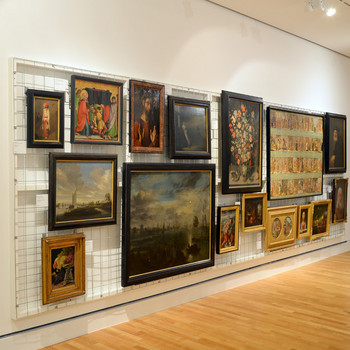
Look! Depot
Discover our highlights in an unusual presentation that offers different perspectives and new approaches to the artworks. Conventional viewing habits are turned upside down!
© GDKE, S. Dinges

Stone Hall
The Roman collection is strongly influenced by the military-focused history of the city of Mogontiacum. Mainz, which was founded as a double legion camp on the Kästrich, became the capital and the military and civil administrative center of the new province of Germania Superior by the end of the 1st century.
© GDKE, U. Rudischer
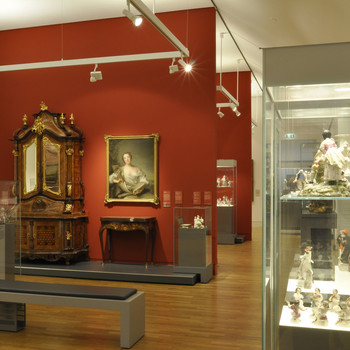
From the Splendor of the Electoral City: Mainz Baroque
After the destruction caused by the Thirty Years' War and the War of the Palatine Succession in 1689, Mainz entered a period of prosperity that lasted over 100 years. Masterpieces of the carpentry of that time, such as the distinctive type of the Mainz writing cabinet, the surveying instruments of the famous architect Maximilian von Welsch, a comprehensive porcelain collection from the Electoral Höchst Manufactory with unique individual figures, can be found there alongside paintings by such prominent artists as Giandomenico Tiepolo, Jean Marc Nattier, Guercino, and Claude Lorrain.
© GDKE, U. Rudischer
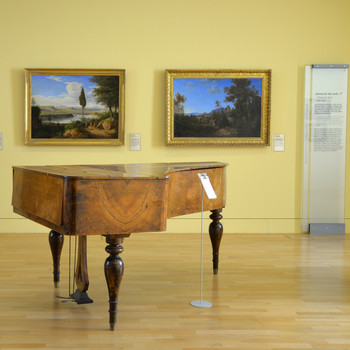
From Romanticism to Historicism
Nationwide renowned painters such as Hans Thoma, Oswald Achenbach, and Wilhelm Leibl are represented in the Mainz Painting Gallery, as well as regional artists like Johann Adolf Lasinsky, Philipp Janz, and Heinrich Jakob Fried. Many paintings come from the estates of Mainz citizens who later donated their collections to the municipal gallery of their hometown.
© GDKE, LMM
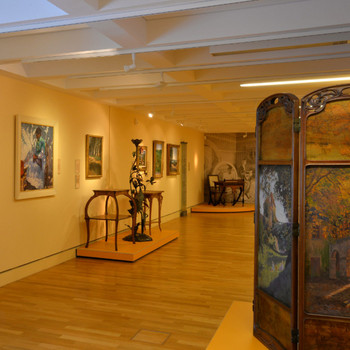
The 'German Impressionists': Art around 1900
A focus is on the 'German Impressionists' Max Liebermann and Max Slevogt, whose mutual portraits highlight the close connection between the painters. Additionally, the painting 'Libyan Desert' from Slevogt's famous trip to Egypt, as well as Tilla Durieux, depicted according to the fashion of the time as a seductive vamp in the role of Potiphar's wife, can also be seen.
© GDKE, U. Rudischer
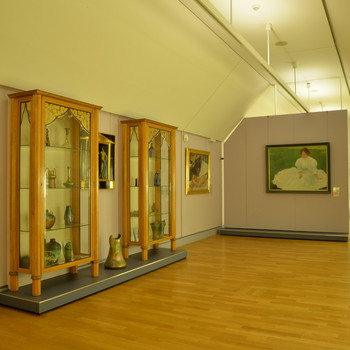
Delicate Glass and Fine Vases: Art Nouveau
The Mainz State Museum holds an exceptional collection of Art Nouveau items from the manufacturer H. R. Gruber, including 52 glasses and vases by Émile Gallé. The collection also features pieces from Lorraine (e.g., Burgin, Daum Frères, Legras) and Bohemia (e.g., Lötz, Gebr. Palme-König). Highlights such as Otto Eckmann’s “Swan Carpet,” Franz von Stuck’s “Temptation – Adam and Eve,” and Adolf Hölzel’s “Schleißheimer Straße” showcase the diverse forms of this era.
© GDKE, LMM, U. Rudischer
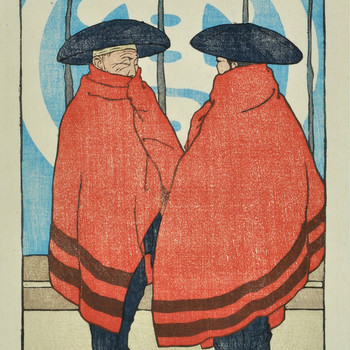
Graphic Paintings
From delicate pencil drawings and ink sketches to vibrant watercolors, woodcuts, and etchings, this presentation showcases the full range of artistic techniques. Highlighting selected pieces from the largest graphic collection in Rhineland-Palatinate, it exemplifies the breadth of our extensive collection. Works on paper by artists such as Albrecht Dürer, Max Beckmann, Ludwig Lindenschmit the Elder, and Käthe Kollwitz illustrate the artistic evolution from the Renaissance to the present day.
© GDKE, LMM
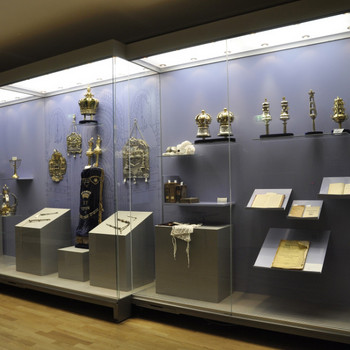
CURRENTLY CLOSED
Judaica: Jewish Ritual Objects from Three Centuries
Most of the objects originate from Mainz, but also from the surrounding region. The oldest date back to the early 18th century, while the most recent are from the early 20th century. The focus of the collection is on silver ritual objects used during Torah readings in synagogues. Inscriptions often name their donors, providing both a means for dating and insight into community life.
You can also visit a range of interesting temporary exhibitions at Landesmuseum Mainz.
You want to explore everything or dive deeper into specific topics? Choose from various exciting tours in the museum. There’s something for everyone to discover, whether you’re an adult, teenager, or child.